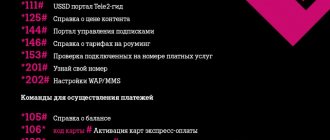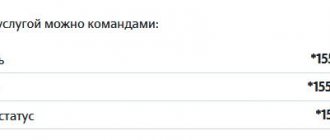“Motiv” is the “home” operator of the Ural Federal District , but, of course, this does not mean that with its SIM card the user will be left without communication in Moscow or Krasnodar. When entering any other region of the Russian Federation, the subscriber will automatically be given the opportunity to use roaming from one of the “Big Four” - MTS, MegaFon, Beeline or Tele2.
After the cancellation of domestic Russian roaming, all incoming calls and incoming SMS throughout Russia are free for Russian subscribers. That is, if a subscriber is traveling around the country, then it doesn’t matter where they are calling him from - answering an incoming call will be absolutely free for him.
On the other hand, the cost of outgoing calls within Russia will cost 10 rubles per minute of conversation. That is, if a Motiva subscriber is located in any “non-home” region of Russia, then calls to any mobile numbers of Russian operators will cost 10 rubles per minute. Calls within the CIS are more expensive – 300 rubles/minute, other countries are even more expensive – 700 rubles/minute.
Outside the “home” region, sending one SMS will cost 6 rubles. And getting 1Mb of mobile Internet traffic costs 10 rubles. Be careful when using these services while roaming.
To reduce roaming costs, it will be enough to connect one of the services provided by the operator.
Roaming 2.0
Free incoming calls in national roaming!
To activate the service, dial: *104*169#
| Activating the service | 12.00 rub. |
| Incoming calls and SMS | 0 rub. |
| Calls to all Russian numbers | RUB 2.00/min. |
| Internet traffic | RUB 2.00/MB |
| SMS to all Russian numbers | RUB 2.00/piece |
| Daily payment | 2.00 rub. |
Features of the service
| The service is provided only in national roaming in the networks of T2 Mobile LLC, VimpelCom PJSC, MegaFon PJSC, MTS PJSC. |
| The service is provided to all MOTIV cellular subscribers, with the exception of subscribers served on business tariff plans: “Dispatcher” and “DATA”. |
| The service does not operate in the network of operators of the Republic of Crimea and the TMT operator of the Republic of Tatarstan. |
If you have any questions related to managing the service, please contact the Contact Center by calling 111 (from a mobile MOTIV) or (toll-free call).
Prices are indicated in rubles including VAT (VAT is calculated in accordance with the current legislation of the Russian Federation).
Source
Other National Roaming options
There is also “Roaming. Conversations" and "Roaming. Non-stop". But the cost of outgoing calls and the daily subscription fee are higher. Therefore, when choosing one of these services, it is recommended to first consult with the operator. You may not like them, and you will remain in “Roaming 2.0”.
How to switch to roaming motive?
The subscriber can activate it independently, in any convenient way: using the USSD command *104*24#, sending an SMS with the text ON to 1078, contacting any of the offices or the company’s Contact Center.
How to enable roaming 2.0 motive?
Activation of the service is possible in 3 ways: Send an SMS with the text “ON” to the number 001169 – to activate the service; and when the need for roaming disappears, send an SMS “OF” to the same number to deactivate
How to disable the roaming service on motive?
If you are connected to “Roaming 2.0”, then you can disable it in 3 ways:
- – by sending SMS 001169 with the text “OFF”;
- – by dialing the USSD command *114*170#call;
- – call number ##914 and after the autoinformer prompts, dial 2#170#.
How to connect the black tariff to the motive?
- Black
- 300.
- *104*102#
How to set up your tariff on a motive?
- Dial: *104*205*2# call – Green
- Dial: *104*60# call – 190.
- Dial: *104*205*3# call – Yellow
- Dial: *104*71# call – Tariff 139.
- Dial: *104*205*4# call – Red
- Dial: *104*70# call – Tariff 39.
- Dial: *104*67# call – Per second
- Dial: *104*54# call – NEXT FREE.
How to disable roaming?
You can disable the “Zero without borders” option by dialing *111*4444#. To disable roaming of the “Everywhere at home” option, which is used for outgoing international calls, you must call *111*3333# or send an SMS to 111 with the short text 33330.
Where is the connection motive?
More than 2,500,000 subscribers use MOTIV cellular communication services: 2,200,000 subscribers in the Sverdlovsk region, 160,000 subscribers in the Kurgan region, 130,000 subscribers in the Khanty-Mansiysk Autonomous Okrug - Ugra and 60,000 subscribers in the Yamalo-Nenets Autonomous Okrug.
How can I find out what my tariff is on a motive?
The “Find out your tariff” option is provided to subscribers of any tariff plans of the company. You can find out your tariff via SMS or USSD service: - using SMS service: send an SMS with the text TF (Latin, capital letters) to the short number 1063; — by dialing USSD request *104*28# (only for GSM subscribers).
How to disable the non-stop TV service in SPB TV Russia?
Dial on your device (except iPad): *111*9999*0*1# call - to disconnect.
How to switch the tariff to black?
You can also activate the “Black” tariff by dialing the command-USSD *630*1# from your phone and then follow the instructions that appear on the screen of your device.
What are the tariffs for the motif?
Tariff plans Motive
- 0.00 rub. Intercity offline
- 5.65 rub. 100 rub. Tariff plan
- 190 rub./m. On-net minute
- 0.00 rub. Intercity offline
- 1.00 rub. 200 rub. Tariff plan
- 270 rub./m. On-net minute
- 0.00 rub. Intercity offline
- 2.00 rub. 300 rub. Tariff plan
How to reload the tariff for a motive?
To reload the tariff, just dial *104*19# and the call key on your smartphone. Be careful, when you activate the service, all unused minutes, SMS and gigabytes will expire.
Related materials
00:02 — June 4, 2020
Climate weapons
Europe has its sights set on world domination.
The environment and coronavirus will help her 00:00 - June 17
New greatness.
Russia can lead the global energy revolution.
What's stopping her? The coronavirus pandemic, which plunged the world economy into a crisis of unprecedented scale, has mixed up all the cards. Environmental requirements have not disappeared; on the contrary, both the European Union and the United States have decided to combine massive programs to support the economy with green goals. In China, the change in the global agenda was quickly assessed. Already in September 2021, at a session of the UN General Assembly, Chinese President Xi Jinping announced plans to achieve carbon neutrality by 2060. US President Joe Biden later promised to cut emissions in half by 2030.
The restructuring of the entire world energy industry will obviously have to be carried out in stages, and the first number in line is the cessation of the use of coal. Renewable energy sources are not capable of providing such capacity in a relatively short period of time, which means that we will have to switch to natural gas, which produces half the greenhouse gas emissions.
This conclusion changes the status of LNG projects. The fact is that the construction of LNG production plants requires large investments, which do not pay off immediately. A sharp economic slowdown in the spring of 2021, as well as the unusually warm winter of 2019-2020, led to an excess of fuel and a drop in prices to a level that was unprofitable even for Gazprom, not to mention LNG production. In conditions of such turbulence, many promising projects on the market have been put on pause. Back in December 2020, a report from the Kola Science Center stated that an oversupply of LNG on the market would become a long-term trend, even despite the cancellation or postponement of new LNG projects.
But by the end of 2021, it became clear to everyone that gas would not only be in demand in the coming years, but a lot of gas would be needed. This means that LNG projects around the world receive the green light and reliable prospects. Qatar was the first to appreciate the change in disposition back in February of this year. State-owned Qatar Petroleum has finally approved the investment decision to develop the eastern part of the North Field East (NFE). It involves the construction of the world's largest LNG production facility. By 2027, the country plans to supply 126 million tons to the market, although over the past ten years it has remained at the level of 77-78 million. By comparison, Russia produces about 30 million tons, although it plans to increase the volume to 140 million by 2035.
Photo: Qatar Petroleum
In the USA, after a break for the coronavirus crisis, construction of several LNG projects should begin at once; in a few years they will operate at full capacity. The current fuel shortage has helped define the role of gas in the global energy mix, and its price has provided funds for investment.
Projects for the construction of LNG plants in Mozambique are being resumed, and negotiations on the construction of a plant in Tanzania have entered the final stretch. New investments have already arrived or are being prepared in the industry in Australia, one of the largest LNG suppliers in the world.
Thus, the current energy crisis provides the LNG industry with clear rules and playing conditions. And if in a few years LNG begins to fill the world gas shortage, this will be unpleasant news for Gazprom. After all, market behavior will have to be negotiated not with OPEC, as in the case of oil, but with Europe, which finances many projects, Qatar, the USA and Australia.
Russia has always denied using gas supplies as a geopolitical weapon. However, for Europe, the very fact of Gazprom’s monopoly is a limitation of competition, and in addition, the range of opportunities for such a large supplier is really high. This is not only a direct restriction of supplies, albeit at the cost of fines, but also pressure in determining the price and volumes of pumping. The gas exchange allows, firstly, to protect oneself from such pressure, and secondly, to limit purchases through the pipeline.
Peter Szijjarto and Alexey Miller
Photo: PJSC Gazprom
The only truly reliable protection against such a policy for Gazprom would be multi-year gas supply contracts, but they need to be signed as quickly as possible, while potential buyers have no choice. The obvious victory was the 15-year contract with Hungary. The conditions are traditionally not disclosed, but, most likely, the Russia-friendly republic received a good discount. But the agreement with Moldova can hardly be considered attractive. Despite unprecedented pressure (the republic was demanded to immediately repay the debt that had been accumulating for decades), an agreement was only reached for five years.
Throughout the fall, Russian officials hinted as best they could that the presence of firm long-term contracts would save Europe from any problems with gas, and that its multi-year bet on the spot market was wrong.
These clever people, back in the previous composition of the European Commission, came up with market pricing for gas. Well, here's the result for you. But we have a different approach. We also have market pricing. This price is tied to the price of oil. Nobody regulates it - the market regulates it. But the vibrations are much more gentle. And those who agreed to enter into long-term contracts with us in Europe can now only rub their hands and rejoice
Vladimir Putin
President of Russia
In mid-October, Putin indicated that Germany receives gas at $230-250 per thousand cubic meters, which is four to five times lower than market prices. And Gazprom, even if it is losing income, is interested in this stability. Because he knows that he will sell at least such and such a volume at such and such a price, and then he builds his investment policy accordingly, the president explained. According to the Russian side, the rate on spot purchases should be reconsidered, as it is fraught with crises.
If the Russian authorities really wanted to teach the European Union a lesson and force them to listen to themselves, then so far there is not a single sign that they have managed to get closer to their goal. At the end of October, the head of the European Commission, Ursula von der Leyen, at a plenary session of the European Parliament, called the cause of the unprecedented crisis too much dependence on gas imports, and the solution was the diversification of suppliers and the development of alternative energy sources. Poland in September, with gas prices already out of control, confirmed that the decision not to renew the contract with Russia would not change.
There is no progress in the certification of Nord Stream 2, quite the contrary. In mid-September, Bloomberg sources said that deliveries along the new route could begin as early as October 1. It is possible that Gazprom itself probed the waters in this way, but the hint was unsuccessful. The German Federal Network Agency (BNetzA) studied the project operator’s application for more than two months, from September 8, and on November 16 reported that it could not approve the registration in this form. To resolve the issue, the Swiss operator of the Nord Stream 2 AG project will create a subsidiary, which will receive assets and resources to manage the pipeline in Germany. Afterwards, the verdict must be approved by the European Commission, where there are many opponents of the gas pipeline, and they are able to extend the process for another four months. According to the managing director of Algo Capital Investment Company Mikhail Khanov, real deliveries may not wait until the fall of 2022. And this is provided that the demands of a group of American senators for new sanctions against the project do not come true.
Photo: Jens Büttner / Dpa / Globallookpress.com
As a result, from November 8, Gazprom, on Putin’s instructions, began to increase supplies to Europe and fill its own gas storage facilities. Such actions immediately led to a reduction in fuel costs.
The story of Rosneft’s access to gas supplies to Europe has also begun to take concrete shape - the head of the Ministry of Energy, Nikolai Shulginov, announced his support for the initiative. If Gazprom's monopoly on pipeline gas exports ends, Europe will have every right to claim victory in the long-running dispute. In fact, for Russia these steps look like a reduction in pressure, but if in exchange for this it received some promises from Brussels, then the information was not leaked into the public sphere. And most importantly, it is unclear what will now happen to the attitude towards Gazprom in Europe.
Gazprom's image is excellent. You have all heard and are aware of the statement made repeatedly over the past few weeks by European leaders and heads of counterparty companies that Gazprom is fulfilling all its obligations. Therefore, this has nothing to do with the image of Gazprom
Dmitry Peskov
Press Secretary of the President of Russia
These words of Peskov can only be applied to the execution of contracts, but in reality, the company’s reputation is affected not only by reliability of this nature. Market behavior, that is, the motives for certain actions, is important. And here, as Mikhail Krutikhin, partner of the consulting company RusEnergy, states, Gazprom has exposed itself in the most unsightly light. The expert recalled that the company refused to take advantage of Ukraine’s offer to halve transit tariffs, contrary to many years of practice, decided not to enter into new contracts during the fourth quarter of this year and the entire next year on its electronic platform and disrupted the schedule for filling European storage facilities.
Photo: Andreas Gebert/Reuters
In his opinion, Gazprom's actions did have an effect in Europe, but the opposite of what was expected. The company presented itself as an unreliable partner, ready to violate market rules. For Russia, such accusations may seem absurd, because formally no treaties have been violated, but in Europe, reputation is built according to different rules.
Russia will undoubtedly receive tactical benefits from the situation. The country's gas revenues will increase in the next few years amid global fuel shortages. But as soon as the situation changes, the argument in the form of a crisis in the fall of 2021 will certainly emerge, and it is difficult to imagine that by that time Gazprom will have more defenders in the EU. And he needs loyalty, because the hydrogen revolution is on the verge, in which Russia really wants to participate.
Information on how to disable the Internet on Motive: Marathon tariff for 6 rubles per day
It is almost impossible to imagine our life without the Internet.
Even when leaving home, we do not part with smartphones, on the screen of which almost our whole life is displayed: communication with friends, the latest news, favorite music, funny videos.
However, it also happens the other way around, when for some reason we need to turn off the mobile Internet.
Dear readers! Our articles talk about typical ways to resolve legal issues, but each case is unique.
If you want to find out how to solve your particular legal problem, please use the online consultant form on the right or call. It's fast and free!
Advantages of the application
The application is free, it makes it possible to perform many operations at the right time while you are anywhere
:
- tariff and service management; (you can choose new tariffs, for example, and connect them in a timely manner)
- account management using a phone or tablet;
- control of the balance of package services: calls, messages and Internet traffic;
- connection of necessary services;
- constant opportunity to learn the latest news and receive notifications about new MTS offers.
Terms of service
Motiv does not have intranet roaming, since the operator is regional and is represented only in the Urals. This means that the entire Urals is the home region for a Motiv subscriber, and everything outside of Russia is national roaming (registration occurs in the networks of other operators).
"Roaming NON-STOP" operates in national and international roaming. In the latter option, in addition to “NON-STOP Roaming”, the “International Roaming” option must be enabled.
The service gives a discount on incoming calls. When traveling around the country, the cost of incoming calls is 0 rubles. in a minute. Abroad, in any country, the cost of incoming tickets is 7.70 rubles. in a minute. These are very favorable conditions, if you remember that the feds have an average cost of 9.90 rubles. in our country, and from 25 to 200 rubles. in a minute abroad.
The connection fee is charged one-time and amounts to 12 rubles. Daily subscription fee 5 rubles. Works only with a positive balance of more than 5 rubles.
Attention! The option is not available on corporate tariff plans. There are separate roaming services for corporate clients.
Scheme 1. Free incoming, preferential outgoing and SMS
Much more comfortable and convenient communication options when roaming in Russia are special options and services that are connected to your standard tariff and phone number. In this case, when going to the warm seas or on a tour of the historical places of our country, your number will remain unchanged, and the cost of calls and SMS will be close to the tariffs of your native region.
All operators in the Urals have similar options and services. In this case, incoming calls will be free, and outgoing calls will cost from 2 to 3 rubles both for calls “home” and for calls to numbers of subscribers in the region of residence. At the same time, you will be charged a fee of about 25-30 rubles for connecting the service one-time. In addition, 3 rubles of subscription fee will be charged every day.
Connection and disconnection methods
Voice assistant
At Motiv, almost any service can be connected via IVR - voice assistant.
Call the number in the format ##925. To activate the service, press “1”, and to disable it, press “2”.
SMS
Enabling and disabling “Roaming NON-STOP” is available through service number 1078. To activate the service, send ON via SMS to this number, and to disable it, send OFF.
USSD commands
- Activation of service *114*24#;
- Delete *114*44#.
Each action is accompanied by confirmation via SMS or push message on the smartphone screen.
Subscriber's personal Internet service
Motiv has a personal account for managing the tariff and options. Subscribers call this self-service service nothing more than “FOX”. Here you can change the tariff, turn options on and off, order details, pay for services and much more.
To log in to LISA, use your number or personal account number as a login. To order a password, send a blank message to number 1070. Next, you need to go to the “Additional services” section, find the name “NON-STOP Roaming” and enable or disable the service. For the action to take effect, you must click the “Accept changes” button.
Call to operator
Motiv operators work around the clock and are always happy to help their subscribers. You can use different channels to communicate with the operator:
- Call 111 from your Motiv phone or dial 8-800-240-0000 from any Russian number. For landline phones you can dial to.
- Support on Viber and WathsApp at +7 (953) 603-7033. Add the number to your phone book, go to chat and write to the operator.
Since the service is paid, in order to connect or disconnect it, you will need to identify the subscriber. You will be asked for your full name and code word (if installed).
Subscriber service offices
If you live or work near one of the Motiv offices, then sales and service office specialists can help you select services and tariffs.
The service standards in the call center and office are absolutely identical and always at a high level. Communication with Motiv specialists always leaves pleasant positive emotions.











